|
Bekesbourne Hill
Bekesbourne
https://whatpub.com/unicorn
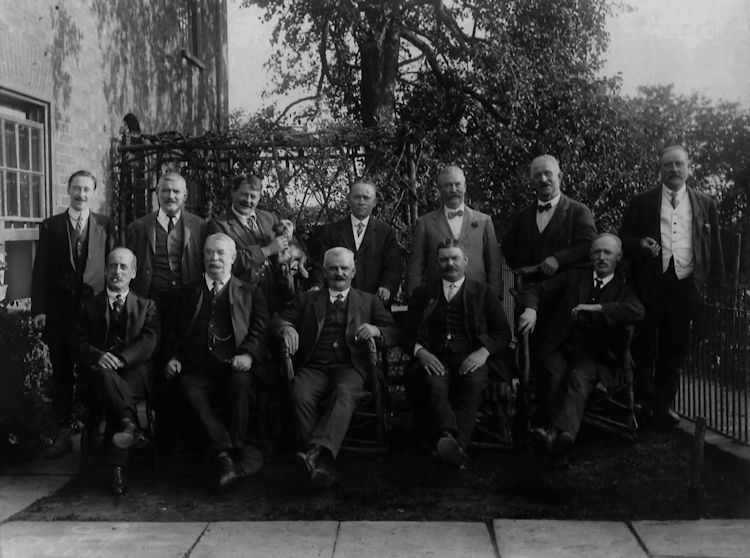
Above photo, 1917. Names unknown. |
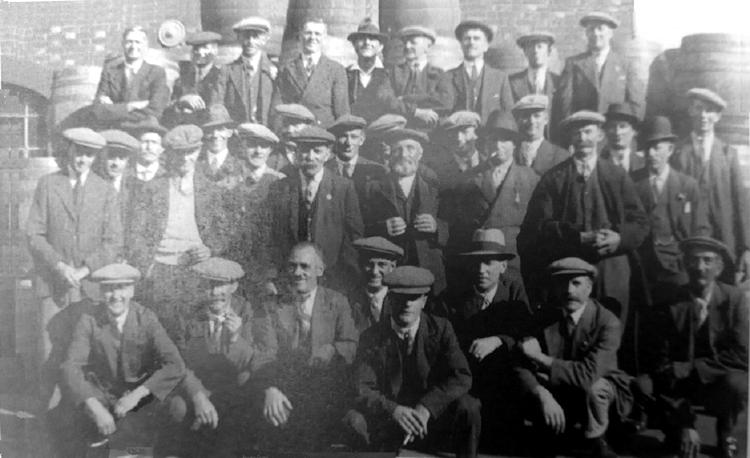
A group of Unicorn regulars from the Bekesbourne, Littlebourne, Ickham
area enjoying the hospitality of Mssrs. Jude, Hanbury & Co. during a
visit to the Dane John Brewery, Canterbury in 1926. The group includes
gentlemen by the names of Fox, Young, Allen, Whybourne, Fagg, Fittal
(x2) E Moon, Buggins, Masters, Justice, Gambrill, Marsh, P Moon, Addley,
Clarke, Rudd, Hussey, Pilcher (x2) Cornwell, Tucker, Bushell and Sayer.
Kindly sent by Rory Kehoe. |
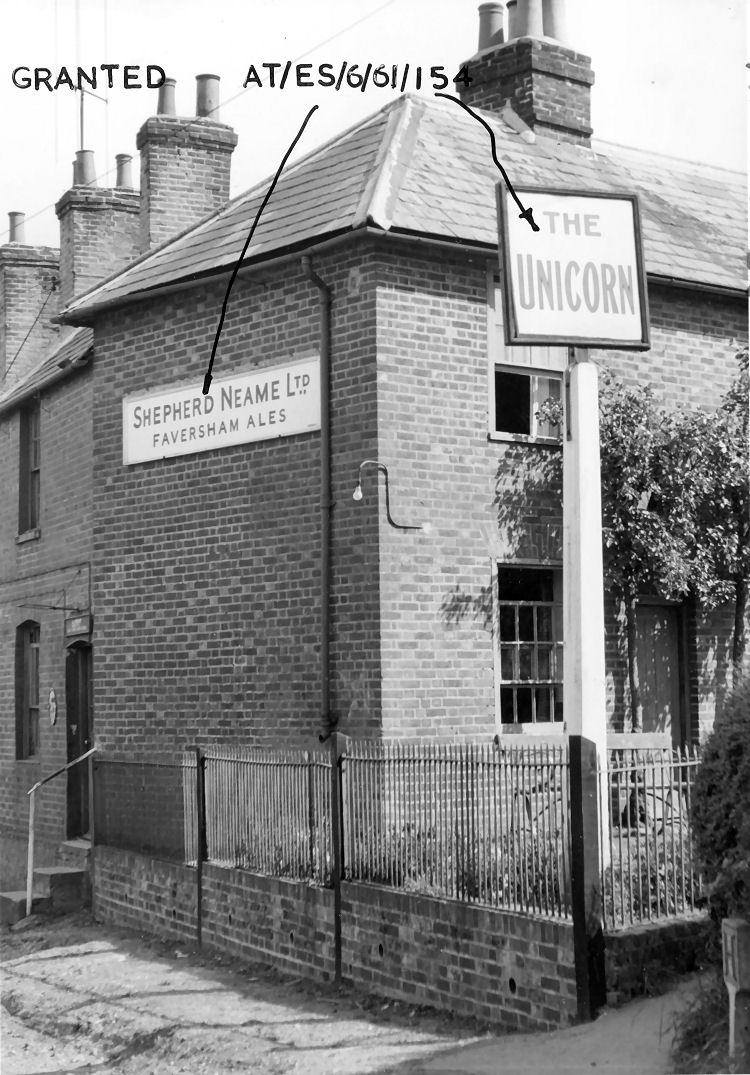
Above photo 25 August 1960, kindly sent by Clive Bowley and Clive
Anthony Swaine. |
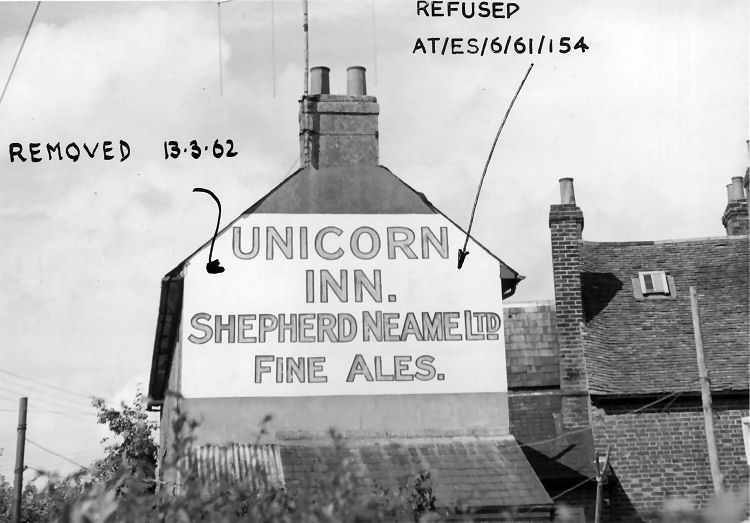
Above photo 25 August 1960, kindly sent by Clive Bowley and Clive
Anthony Swaine. |
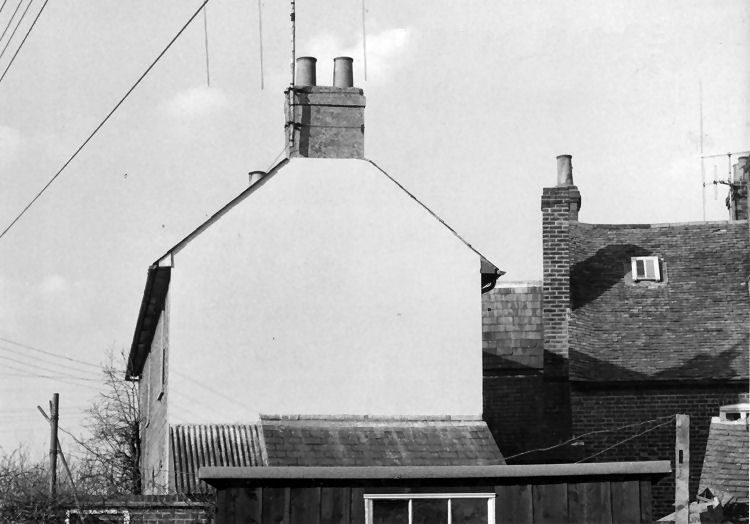
Above photo 13 March 1962, kindly sent by Clive Bowley and Clive
Anthony Swaine. |
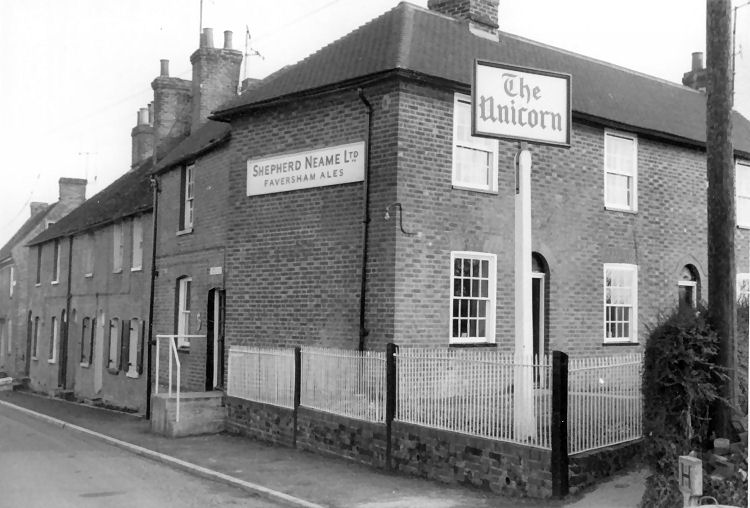
Above photo 13 March 1962, kindly sent by Clive Bowley and Clive
Anthony Swaine. |
%205.6.84.jpg)
Above photo, 5 June 1984, by Jim Ashby. |
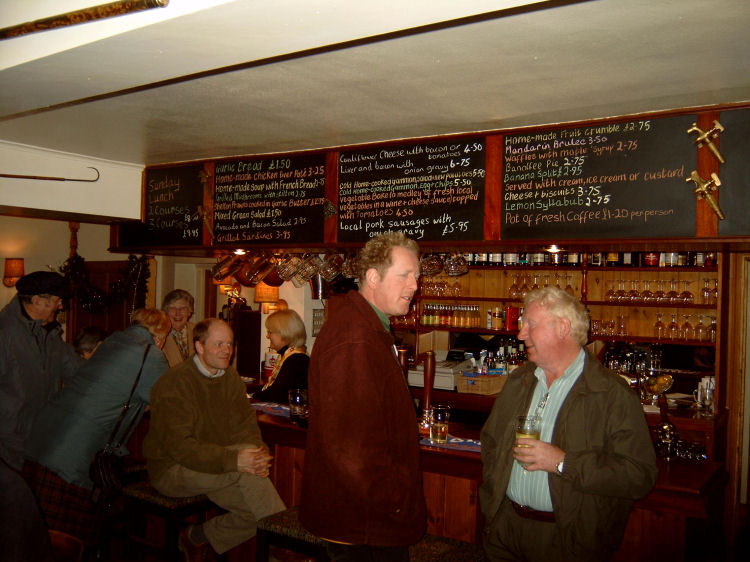
Above photo, 2002, kindly sent by Geoffrey Hall. |
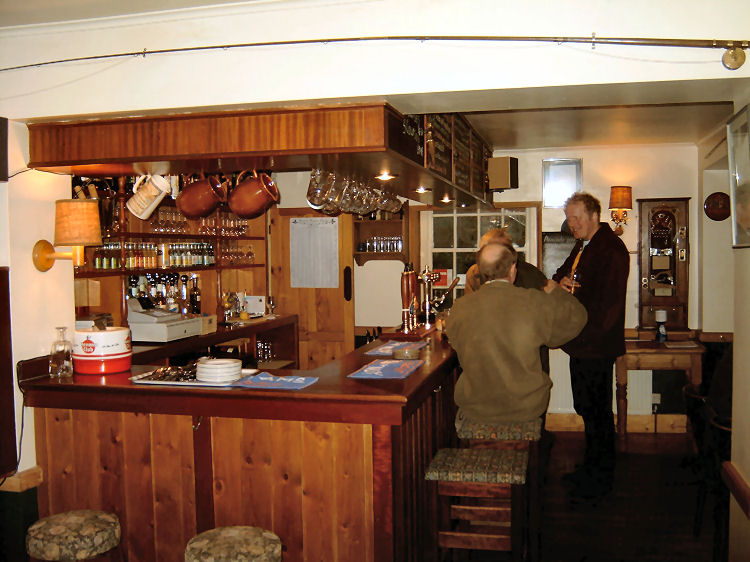
Above photo, 2002, kindly sent by Geoffrey Hall. |
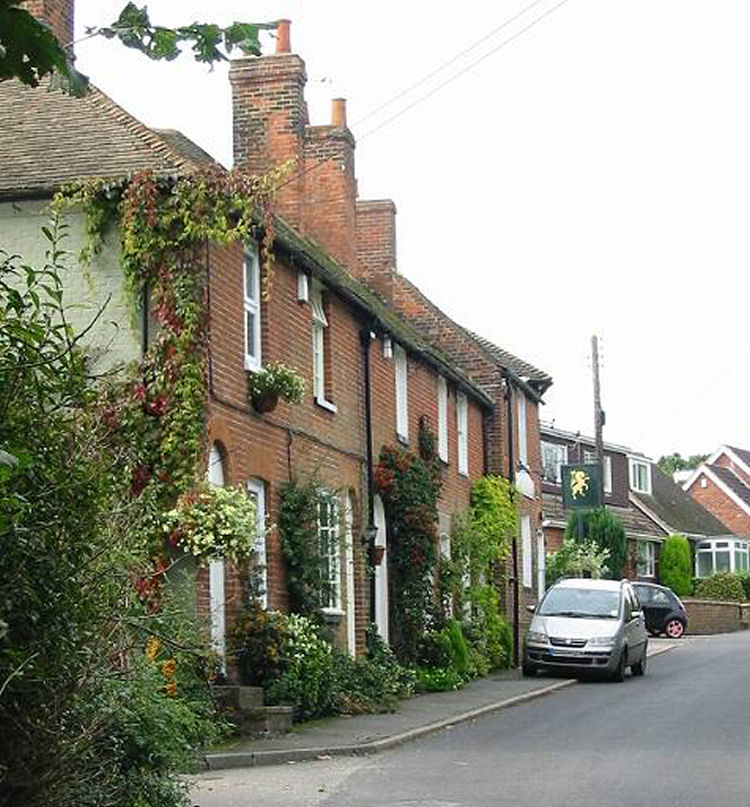
Above photo circa 2007.
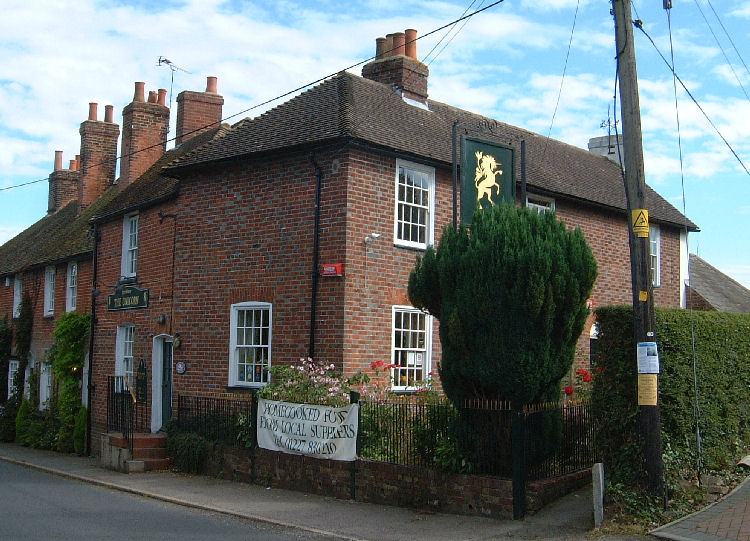
Above photo taken by Paul Skelton 22 Aug 2008. |
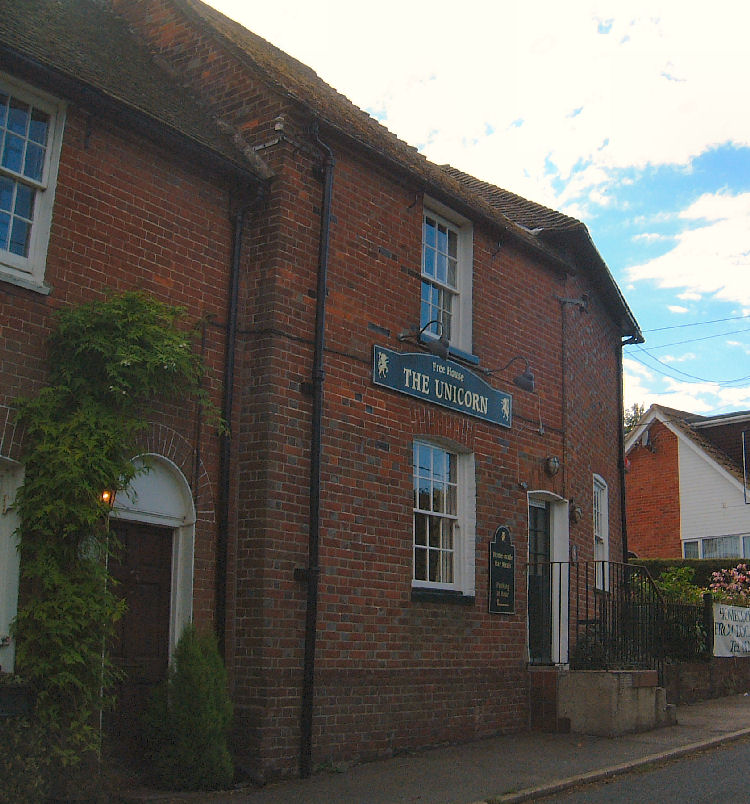
Above photo taken by Paul Skelton 22 Aug 2008. |
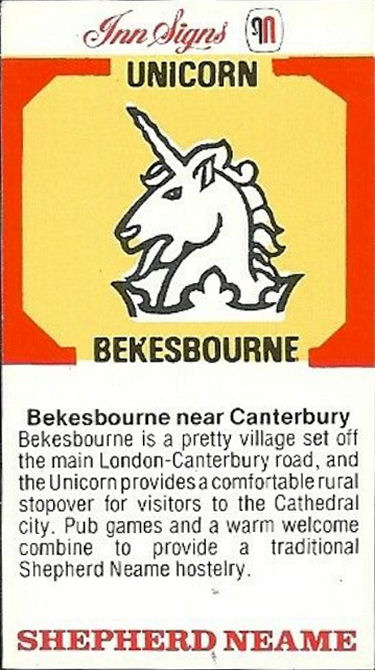
Above card from the Shepherd Neame Inn Signs Passport 1982. |

Above sign 1984, by Jim Ashby. |
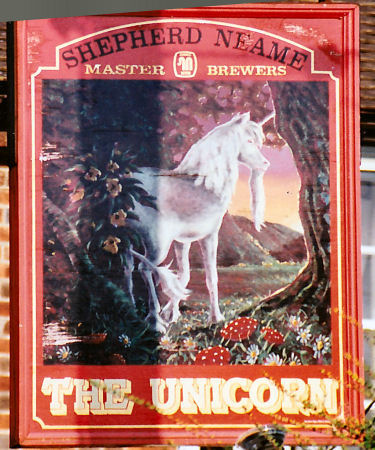 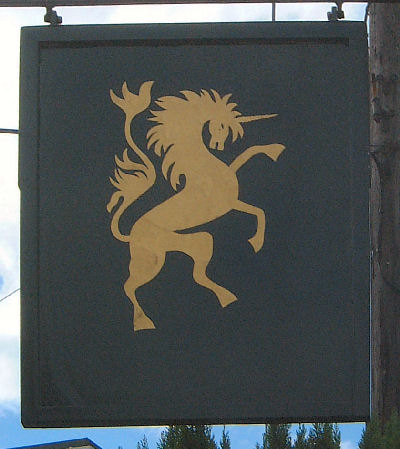
Above sign left, July 1991. With thanks from Brian Curtis
www.innsignsociety.com.
Sign right taken by Paul Skelton, 22 Aug 2008. |
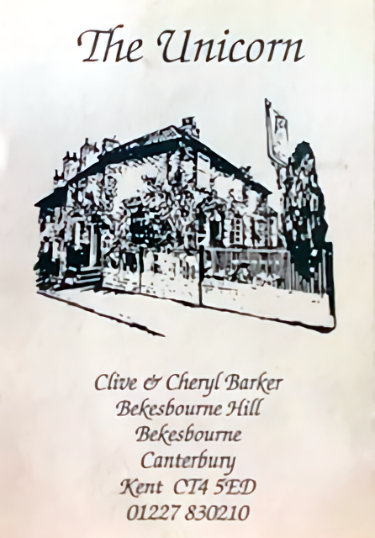 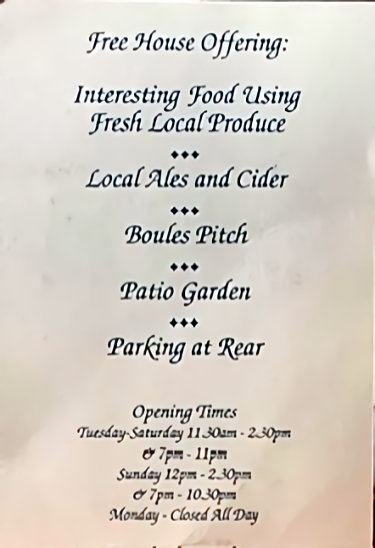
Above picture showing a business card circa 2000. Kindly sent by Jack Goodhew. |
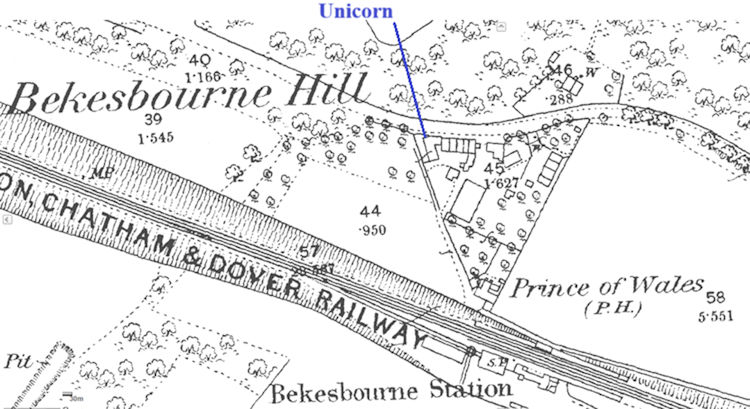
Above OS map 1871. |
|
South Eastern Gazette, 7 February, 1860.
THE LATE FATAL RAILWAY ACCIDENT AT BEAKSBOURNE.
We mentioned in our last impression that three men, named Thos.
Jackson, Richard Lee, and John Carr, had been buried alive by an
immense slip of earth, at the Beaksbourne-hill cutting, and that
although the bodies of two of them had been discovered, the workmen
had been unable, up to the hour at which our report was dispatched,
to remove them, owing to the dangerous state of the soil. One of the
bodies was, however, soon got out, and in the course of Tuesday
morning the other two were also extricated. Two of the men were
found perfectly upright, and apparently uninjured externally, but
the third man was discovered flat on the ground, with his head and
face much bruised and damaged. The three bodies, as they lay
together, presented a sad spectacle, and were looked upon with
mournful interest by the few spectators that were present.
Fortunately all the deceased men were single.
Shortly after noon, on Tuesday, Thomas Thorpe Delasaux, Esq.,
coroner, held an inquest on the body of Thos. Jackson, at a beershop
in the village of Beaksbourne. Mr. William Gardener was the foreman.
The jury proceeded to the scene of the accident and viewed the body
of Jackson. There was but one other body by his side, but while the
inquiry was proceeding, the third body was got out and placed by the
side of his comrades. The jury having returned to the inquest room,
the following evidence was taken:—
William Taylor deposed that he had been employed on the London,
Chatham, and Dover Railway, for the past two months. On Friday last
he was working in the cutting as driver, close to where Jackson was
filling trucks. At a few minutes before five in the afternoon,
Jackson was at work under the boarding, and witness asked him if he
and the waggons were to go out, and he replied "Yes." Jackson then
asked for a piece of candle, and witness crept by the waggon to
reach it to him. He then told his horse to move on, and just as he
did so, the earth fell on the waggon, and partly on himself and the
horses. He was only just able to get away. He never heard the
deceased speak afterwards. He (deceased) was completely smothered in
by the earth. The earth, under which the deceased was working, was
supported by timber, and which was thought to be of sufficient
strength to bear the weight of the earth above.
Charles Cooper, a miner, deposed that he had been "driving" and
"heading" on the London, Chatham, and Dover line. He had been
informed that some men had been buried in a cutting, and he
immediately pulled off his outer clothes, and commenced timbering
the place where the men were buried, to make it safe to get them out
again. He worked at the place until the men were found. He thought
the timbers were sufficient to bear the earth that fell in, had it
not been for the wet, which had shifted the timber. Witness found
the deceased (Jackson) on Sunday night, and got him out on Monday
afternoon, but did not know what time. He was quite dead, and
witness had no doubt he was suffocated in the cutting. He thought
the falling of the earth was the result of an accident.
Mr. Thomas Walker, civil engineer, deposed that he had been engaged
for some time on the London, Chatham, and Dover line, as manager for
Mr. Crampton, the contractor. On the previous Thursday his attention
was called to the "heading" where the accident occurred, not because
it was dangerous to life, but for the purpose of altering the mode
of working the cutting. He went into the "heading," and examined it
most minutely. He considered it perfectly safe, and was in it nearly
an hour. He came to the conclusion that in consequence of a portion
of the "heading" having given way in advance of the spot where the
accident occurred, he would spare no pains or expense in order to
make the place secure; and he gave orders that everything should be
done to prevent the possibility of an accident. He thought, however,
that it was quite secure enough, so far as accident and life was
concerned.
The Coroner then proceeded to sum up the evidence, and reminded the
jury that they had two things to consider in coming to their
conclusion — first, as to the cause of death, and secondly, what led
to that cause; and when he drew their attention to what produced the
death, it would be for the jury to say, whether every precaution had
been taken to prevent, if possible, such an accident as that into
which they were inquiring. From the evidence of William Taylor,
there could be no doubt as to the cause of death it was the falling
in of the soil which smothered the deceased. The question then
arose, whether the proper precautions had been taken to prevent an
accident of that kind? Upon that point the evidence of the men, and
also of Mr. Walker, was perfectly clear and satisfactory, and
therefore the jury could have no hesitation of saying that the
deceased’s death was caused by an accident, and that there was no
blame attachable to any one.
One of the jury here expressed a wish to have the evidence of the
foreman, as to the nature of the timber used in the cutting. This
was accordingly assented to, and John Goodyer was called. He said he
was foreman of the works on Beaksbourne-hill. The timbers which
supported the "heading" where the accident occurred were of
sufficient strength to prevent an accident under ordinary
circumstances. He attributed the accident to extraordinary wet
weather. He had worked on the railway works for 24 years, in the
same capacity as he was at that time. From his experience he thought
that every precaution was taken to prevent accident in the present
instance.
By the Jury:— The men who drove the "headings" were miners and
perfectly competent for the work. They were discharged on the
previous Saturday, as it was not intended to continue working the
"heading," it being dangerous to do so. The timber was proper for
the purpose, and such as was generally used.
The Coroner:— Is not iron sometimes used in connection with these
cuttings?
Mr. Walker replied in the affirmative.
The Coroner:— Then would it not be safer to use Iron instead of wood
in the "headings."
The Foreman expressed his opinion that every possible precaution was
taken by the contractors in constructing the line, with the view of
preventing accidents; and he mentioned that not a single accident of
that kind had occurred before since the present foreman had been
employed.
The jury returned a verdict "That the deceased was accidentally
suffocated."
The Coroner then went and viewed the other bodies, and gave a
certificate for their burial.
Funeral of the Deceased Men.:— On the afternoon of Thursday, between
three and four o’clock, the remains of the unfortunate deceased were
buried in the pleasantly situate churchyard of the village in which
they met their untimely end. There was a numerous assemblage of
spectators, considering the state of the weather, flakes of snow
occasionally falling, with a strong wind from the northeast. Soon
after 3 o'clock the funeral procession was formed in the following
order:— The foreman of the navvies and the undertakers (Messrs.
James and Thomas Kelson); the three bodies in excellent elm coffins,
covered with silk palls; about 100 navvies, in clean smook frocks,
each with a white bow on his breast; the public, villagers, &c.,
closing the mournful cortege. It was a sad and melancholy spectacle,
and many who witnessed its progress wept as it passed along. The
Rev. Mr. Taswell, the incumbent, read the beautiful funeral service
very impressively, the church being filled, principally by navvies
desirous of paying the last mark of respect to the remains of their
deceased comrades. The quiet and orderly demeanour of the navvies
was the topic of general observation. As they were passing from the
grave-yard to their homes, Mr. John Elgar (a member of the Society
of Friends) addressed a few words to them, which were well received.
The superintendence of the funeral was entrusted to Mr. James Kelson,
of Whitstable, who had been engaged in watching the progress of the
works from the time of the accident, and was authorised to spare
neither pains nor expense to render the cutting safe against further
casualties. The manner in which it was conducted reflects the
highest credit on the acting engineer, Mr. Walker, who, we are
informed, has liberally rewarded the brave miners who risked their
own lives in their efforts to extricate the unfortunate deceased.
|
|
From the Kentish Gazette, 4 October 1890.
BEKESBOURNE. Alleged breach of the licensing acts.
At St. Augustine's Petty sessions, on Saturday, before T. G.
Peckham, Esq., G. Furley, Esq., C. Prestcott-Westcar, Esq., and
Captain Lambert.
Charles Bushel, landlord of the "Unicorn" Bekesbourne, was charged
with opening his license premises during prohibited hours on Sunday,
September 14.
Mr. R. M. Mercer appeared for the defendant.
Sergeant Hancock said on Sunday morning, the 14th September, he
watched the defendants house in company with P.C. Predeth. He
watched from about 5:30 a.m. till about 11 a.m. Just before 8
o'clock the defendant opened the back door and came out, looked
around, and then went in again.
At 8 a.m. he saw James Preston, a labourer, residing at Bekesbourne
Hill. He had a look round and then enter the house by the back door.
He was inside the house four minutes. At 8.10 a.m. James Munns,
labourer, walked straight to the back door and went inside the house
he was inside five minutes and then went away. At 9.10 a.m. a man
named Green, of Canterbury, accompanied by a soldier named Kemp,
whose father resides at Bekesbourne, went in by the back door. He
lost sight of them for about 10 minutes and then they came from the
front part of the house and at 9.20 a.m. he saw John Collins,
news-vendor, of Canterbury, enter the house by the back door. He was
in about 2 minutes. The door was open all the time. At 11.5 a.m. he
saw George Court, labourer, Bekesbourne, go into the back door and
enter. Witness then left his hiding place and just inside the back
door he found Court standing with some money in his right hand which
he popped into his pocket. Court did not appear to recognise
witness, who was in plain clothes. The defendant did. The defendant
was standing near the sink and quickly put a pint pot and a glass in
a pail of lightish coloured water, he should think it was soap suds.
Witness told defendant there appeared to be some cause for the
complaints that had been lodged against him. Defendant said "I did
not know there have been any complaints." Witness said he had sent a
Constable to caution him twice as he was a young beginner. Defendant
said this is the only man that has been in my house this morning,
and he has had nothing to drink. There was a good deal of excitement
in the house and defendant's wife produced a withered rose, stating
that she had called Court to see this rose. She also said court had
not had any beer. There was some beer in the pot he took from the
pail. Witness shot this out and called defendant's attention to it.
He told defendant this was the 6th person he had had in the house
that morning. Defendant and his wife said they could swear they had
not been six. Witness replied "I have been watching and I know."
Defended admitting having some Canterbury people in. When he
mentioned Munns' name, defendant said "Oh, he brought me a few
turnips." He also said that Preston came in to change half a
sovereign and had a bottle of Ginger Beer. He said the others were
bonafide travellers. Defendant also said that when Court came up he
defendant had some beer in a pot. He gave court one glass and seeing
him witness he put the other in the pail. A few nights afterwards he
saw the defendant and said "I have seen Munns' and he says he gave
him a pint of beer for a few turnips; is that so?
Defendant said "yes."
Cross examined, Munns admitting having taken the turnips, and said
he had given them to defendant who gave him beer for them. Defendant
said he had been hop drying with Munns, and that Munns came over on
the Sunday to pay over his share of the money. He had every reason
to believe the man did not live at Bekesbourne. He was watching from
the top window of the oasthouse, and could see everything most
distinctly. It was an undoubted fact that Sunday morning was used by
publicans as a washing up day and that they got their bottles and
glasses about for that purpose. He saw a pail which probably
contained soda water.
P.C. Predeth, who was watching with the sergeant, corroborated.
He said Court had fresh froth on his moustache which he wiped off
with the back of his hand.
Mr. Mercer, in defence, said the police had an idea which he thought
was a common one, but which was never the less a very ignorant idea,
that a licensed victualler could not have any person in his house
during closing time. There was no law of the kind, but if he did so
he might be called upon to prove he had not infringed the law in any
prima facie case could be made against him. Mr. Mercer went on to
comment in very severe terms upon the evidence of Sergeant Hancock.
It was most unsatisfactory that he should have spoken in such a
loose way as to whether the soldier had slept in Bekesbourne that
night or not.
James Munns, of Beaksbourn, labourer, said he had been acting as
mate to defend an in hop drying. He received the money from Mr.
Reynolds on Saturday night. On Sunday he went to defendant to pay
him his share. He also took him five turnips and was given a pint of
beer. No money passed.
Cross examined: He did not expect to get beer when he took the
turnips. He had never been to defendant's on a Sunday morning
before. Witness received a bank note. Defendant would not take it on
Saturday night because he had not sufficient change. On Sunday he
would not have it, because Sunday was no payment at all (laughed).
James Preston, a labourer, residing close to the public house, said
he went to the house to change half a sovereign because he was going
out. He got change and had a bottle of Ginger Beer.
William Kemp as soldier, said that he went to the house with Green
on the Sunday morning. He walked from 21, Burgate Lane, Canterbury,
that morning, and was served as a traveller.
By Superintendent Wood- He was on furlough from Aldershot. He never
called at his father's that day. He did not consider his father's
house his home.
Frederick green, residing at 21, Burgate Lane, gave similar evidence
as Kemp.
George Court said he lived close to defendant's house, and on the
morning in question the defendant's wife asked him for a rose. He
went in, but had nothing to drink.
Charles Bushell, the defendant, said he had occupied the house a
year and 10 months. Every Sunday a man, named Collins, brought him
in papers and he gave him a glass of beer for this. He understood
this have been the custom for 20 years. He gave Munns a glass of
beer, but he never received or expected payment for it. Munns owed
witnessed £3 17s 6d. Preston asked for change for half a sovereign,
and as he wanted some coppers he had a bottle of Ginger Beer.
Kemp and Green told him they were bona-fide travellers, having come
from Canterbury. After inquiring he supplied them. He had never been
cautioned.
By Superintendent Wood:- He gave Munns the beer because he had come
to pay his bill. Witness had no change for the £5 notes that he was
tendered in payment. Mr. Peckham said the magistrates after
reviewing the whole of the evidence, and what had been a adduced for
the defence, did not think the case demanded conviction. At the same
time the defendant should be extremely careful and not keep his door
open in this way or he would get himself into serious trouble.
|
|
From Whitstable Times and Herne Bay Herald 12 September 1891.
ST AUGUSTINES PETTY SESSIONS.
SATURDAY, September 5th. - (Before O. C. Waterfield, Esq., in the chair,
and Captain Lambert).
BREWSTER SESSIONS.
This being the annual licensing session, Superintendent Wood presented
his annual report which was as follows:-
"I most respectfully beg to submit my annual report as to the conduct
of the licensed houses in this division during the past year, which
have, with a few exceptions, been generally well conducted. In September
last the landlord of the "Unicorn" beer-house, Bekesbourne, was summons
for illegal trading, but was NOT convicted. This house was not in my
opinion, so well conducted the first part of the year as it might have
been, but I have no reason to complain.
I have no complaint to make against the house. There are 102
fully-licensed houses, 36 beerhouses, and 11 grocers and others licensed
to sell beer, spirits, and wine not to be consumed on the premises.
Thirty one persons ( 26 males and 5 females) have been proceeded
against, and 30 convicted for drunkenness and drunk and disorderly
conduct, this being one less than the previous year." The whole of the
licences were then renewed, and the sessions adjourned for three weeks
when applications for new licences will be heard.
|
|
Canterbury Journal, Kentish Times and Farmers' Gazette, Saturday 10 October 1903.
Births.
Taylor:- On the 30th September, at the "Unicorn," Bekesbourne, the
wife of W. Taylor, of a son.
|
|
From an email receives 20 September 2015.
I have attached a picture of
my Great Uncle Albert and Aunt Alice, who I never met and have only
recently heard about. He, Albert Rennells, was my maternal grandmother's
brother and the photo was taken on their wedding day in 1916.
They became Landlord and Landlady of the "Unicorn" in Bekesbourne in the
1940s – and were there for most of the 1940s according to my Aunty
Betty, their niece aged 89, with whom I spoke this morning.
I think it's
a nice photo, in its innocent style with their touching pose. She is the
image of my sister.
Many thanks,
Stuart Eaton.
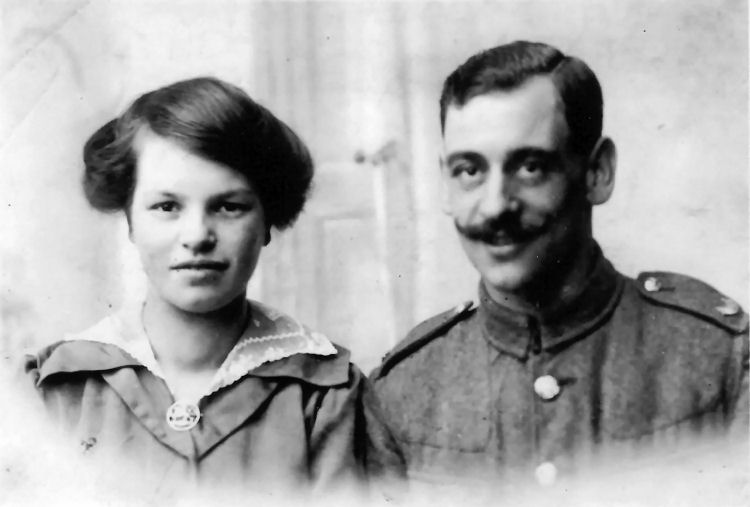
|
|
Whitstable Times and Herne Bay Herald, Friday 13 June 1980.
Licensee is on a 550-mile pub crawl.
LICENSEE Derek Miles is on a 550-mile pub crawl with a difference.
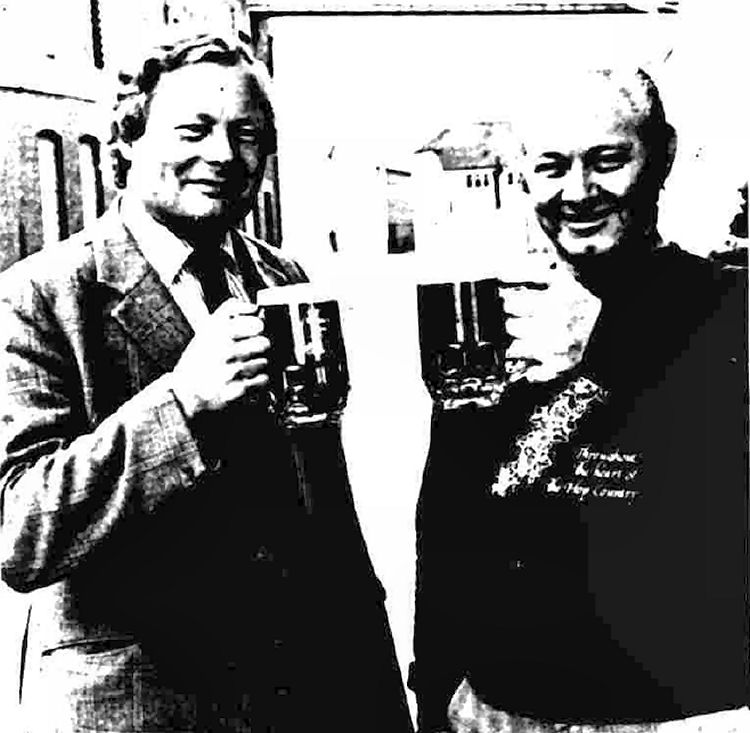
Licensee Derek Miles pictures with Shepherd Neame chairman Mr.
Robert Neame before starting his long walk.
For 43-year-old Derek, tenant of the "Unicorn" at Bekesbourne, is
staging a charity walk throughout Kent, Sussex, Surrey, London and
Essex visiting every one of Shepherd Neame's 236 public houses.
His solo effort is all in a good cause, and he will be raising funds
on the way for licensed trade charities and Guide Dogs for the
Blind. He was due to be accompanied by two friends, but both have
now had to pull out.
"Still, I'm good company for myself." says Derek, "and I shall be
accompanied at least part of the way by my brother Alan, who'll be
driving the transport."
Derek intends covering an average 24 miles a day at a rate of three
miles an hour. Most evenings, he will be driven back to his pub by
Alan, who will return him to the relevant starting point the next
morning.
Derek calculated the walk will take between three and four weeks to
complete.
His route, beginning at Shepherd Neame's Faversham brewery, is
taking him via Sheppey, the Medway Towns. Maidstone, north Kent,
south London, Surrey, and west Kent, across into the Weald, down to
the Sussex coast, and back towards east Kent by way of Dover, Deal
and Thanet. He was seen off from the brewery by Shepherd Neame
chairman Mr. Robert Neame.
Trickiest part of the trek will be "across the water" into Essex to
visit Shepherd Neame's only public house in the county, the
"Rabbits" at West Thurrock.
"I'll probably have to cheat a little, because the Dartford Tunnel
authorities are unlikely to let me walk through the tunnel." says
Derek. "So it'll be the only part of my marathon where I'll be
compelled—willingly—to accept a lift."
Derek insists he is in good fettle. "Anyone who’s ever worked behind
a bar will know just how fit that keeps you," he says.
The walk is by far the longest trek ever under taken by Derek, even
since his route marching days as a corporal in the Royal Engineers
28 years ago.
Derek is not prepared to hazard a guess on the final total he will
collect—he is hoping for a cash collection at all 230 pubs—but he
has been sponsored for £250 by Otim Industries of Herne Hay, and has
pledges of clothing footware and transport from other backers,
including the office cleaning company run by ex Kent cricketer
Norman Graham and Shepherd Neame.
Although Derek's daily absence means extra work at the "Unicorn" for
his wife. Barbara, she is hoping he will complete the course in
style. For Barbara is treasurer of Canterbury, Herne Bay and
Whitstable Ladies Auxiliary, the organization of tenants' wives and
lady licensees, and her branch is looking forward to receiving some
of the charity cash raised.
|
|
From the
http://www.canterburytimes.co.uk 20 February 2013. By Liz Crudgington.
Pair call last orders on their loss-making pub in
Bekesbourne, Canterbury
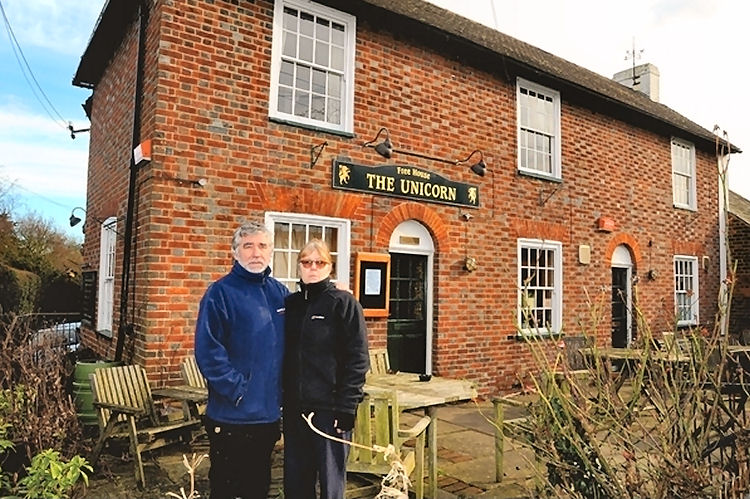
SHUT DOWN: Martin and Shirley Short outside The Unicorn pub
A COUPLE have called time on their village pub – after sinking a
£20,000 inheritance and a monthly subsidy of £1,000 into trying to make
it work.
Martin and Shirley Short took over The Unicorn in Bekesbourne, near
Canterbury, in 2008 and had high hopes for their new business.
But after five years of hard work and losing money, they have called
last orders for the final time, blaming a combination of the recession
and supermarket alcohol deals.
Mr Short, 60, said: "Supermarkets have set the benchmark that
everyone thinks about when they think of prices.
"But you wouldn't go into Starbucks and tell them how much the coffee
costs in Morrisons."
The couple, who have grown-up children, had both worked in pubs
before and researched the industry further before buying The Unicorn.
Mrs Short studied for her food hygiene certificate, and both were
granted personal licences.
Mr Short, who continued with his plumbing and heating business using
profits of up to £1,000 a month to help keep the pub open, said: "We
knew what we were getting into. But no one knew how bad the recession
would be.
"We had some progress when we first took over but we could see people
coming in less and less."
Mr Short said he knew of one pub that had put flyers through every
house in the village urging people to use it or lose it, and others that
were struggling.
He added: "It is hard work, but we didn't mind that. But when you are
doing 14 hour days, six days a week, and don't manage to make a profit,
it is time to stop."
The couple had times when they saw no customers for two or three
days, but they continued to open.
Mr Short said: "We just couldn't continue like that. It came down to
finances in the end. The bank tried to foreclose on us and it was only
because I had an inheritance due that we were able to fend them off."
The pair applied to convert the pub into a house in December, but had
to wait until last week for permission to be granted after villagers
sent five letters of objection to council planners, meaning it had to be
discussed by the committee.
They now plan to convert the pub as quickly as possible so they can
stop paying business rates and other commercial overheads. They intend
to continue living there. |
The pub closed in February 2013 and has been converted into a private
house.
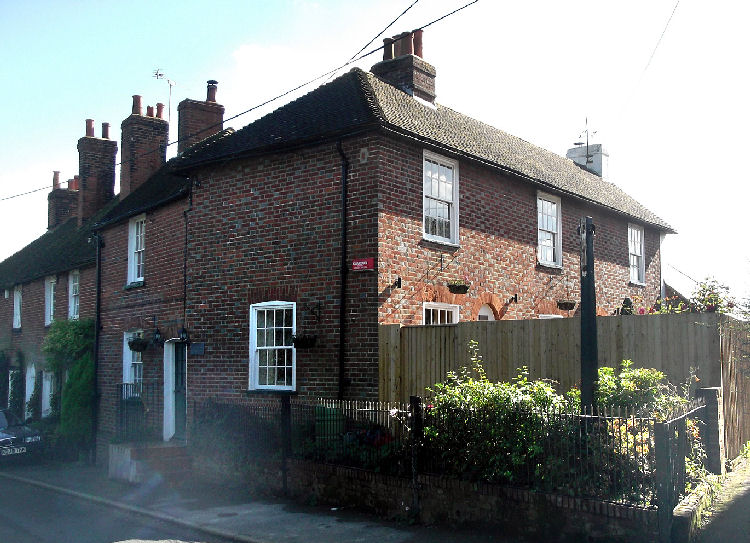
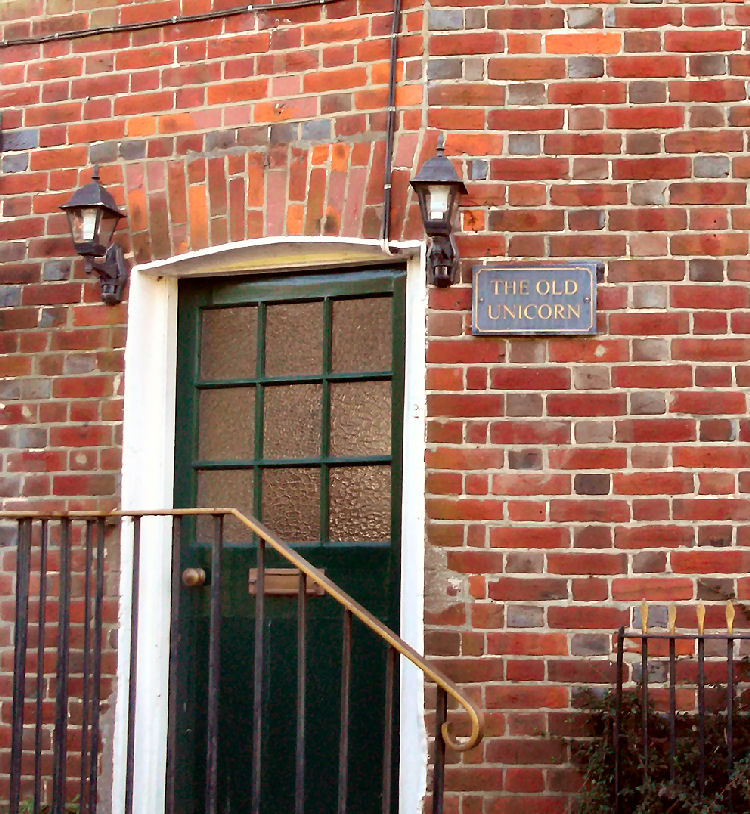
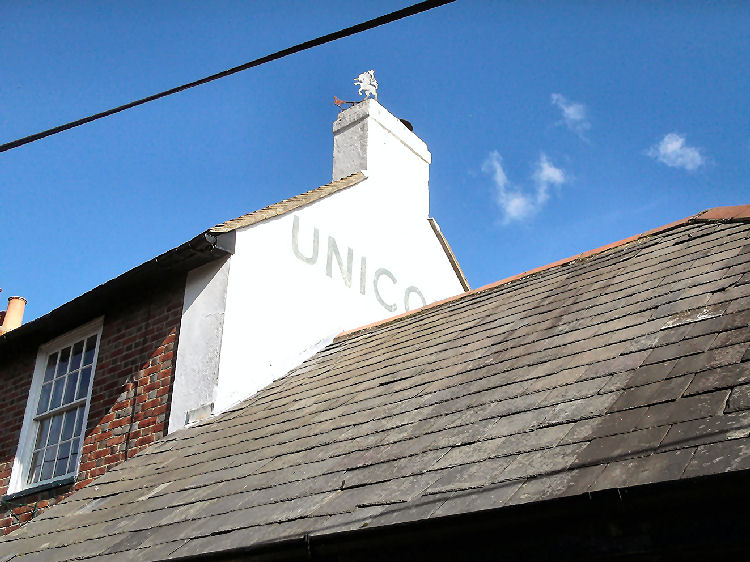
Above photos October 2014, kindly sent by Peter Checksfield. |
|
From an email received 21 December 2019. Albert and Alice Rennells
were my maternal grandparents. Bill Rennells, their son my Uncle writes
about moving into the "Unicorn" just before the war started.
http://www.silverrobin.co.uk/world-war-ii-in-canterbury-2/ Joyce in
the article was my mother. Bill is still alive and (pushing 90 I think)
and can still be heard on BBC Radio Kent on Sunday evenings doing his
program Harmony Night, very popular with his generation.
One story I remember him telling of his time at the pub was of a
Canadian airman who entered the pub highly inebriated. He must have been
bad for my Grandad to refuse to serve him as as it would have been
unusual for him to miss an opportunity to take money off someone but
refuse him he did. The airman staggered out the front door turning into
the alleyway beside the pub and entered the pub again through the side
door. He walked up to the bar and on seeing my grandad again said
'blimey, how many pubs have you got in this village.' |
LICENSEE LIST
CLOKE Stephen 1851-61+ (age 50 in 1861 ) )
WHALE Jonathan 1871+ (age 25 in 1871 ) )
BARTLETT Elijah 1881+ (age 46 in 1881 ) )
BUSHELL Charles Jan/1889-99 dec'd
TAYLOR Annie C 1901-03+ (age 39 in 1901 ) )
BROWNING Charles Frederick 1911-13+ (age 46 in 1911 ) )

NEWPORT Edward 1938+
RENNELLS Albert & Alice 1939-1940s+ (age
33 in 1938)(Albert
was brother of Bob of "Nag's
Head," Canterbury.)
 MILES Derek and Barbara late 1970s
MILES Derek and Barbara late 1970s
BARKER Clive & Cheryl 1995-2008
HEAD M J & M 2008
SHORT Martin and Shirley 2008-Feb/2013
https://pubwiki.co.uk/Unicorn.shtml
 From the Post Office Directory 1913 From the Post Office Directory 1913
 Census Census
|






%205.6.84.jpg)

















